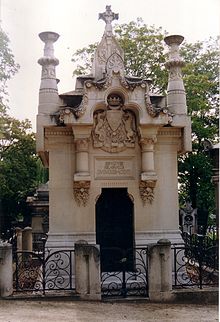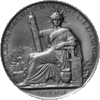Charles, duc de Morny
Charles de Morny | |
|---|---|
Charles Joseph de Flahaut Hortense de Beauharnais | |
| Signature |  |
Charles Auguste Louis Joseph de Morny, 1st Duc de Morny ([ʃaʁl oɡyst lwi ʒɔzɛf dəmɔʁni]) (15–16 September 1811, Switzerland – 10 March 1865, Paris) was a French statesman.
Biography
Morny was born in
Morny was educated by his grandmother,
When Morny returned to Paris in 1838, he secured a solid position in the business world by establishing a major
Although Morny sat as deputy for Clermont-Ferrand from 1842 onwards, he took at first no important part in party politics, but he was heard with respect on industrial and financial questions. He supported the government of
After six months in office, during which Morny showed his political opponents moderation and tact, he resigned his portfolio, ostensibly because he disapproved of the confiscation of the Bourbon-Orléans property but really because Napoleon, influenced by Morny's rivals, resented his claim to a foremost place in the government as a member of the House of Bonaparte. He then resumed his financial speculations. When in 1854 the Emperor appointed him president of the Corps Législatif, a position which he filled for the rest of his life, he used his official rank to assist his schemes.[4]
In 1856, Morny was sent as special envoy to the coronation of Tsar

In spite of occasional disagreements, Morny's influence with the emperor remained great, and the liberal policies which he advocated enabled him to serve the imperial cause through his influence with the leaders of the opposition, the most conspicuous of whom,
Morny's valuable collection of pictures, including Jean-Honoré Fragonard's The Swing, was sold after his death. In spite of his undoubted wit and social gifts, Morny failed to secure the distinction he desired as a dramatist, and none of his pieces, which appeared under the pseudonym of M. de St Rémy, including Sur la grande route, M. Choufleuri restera chez lui le . . ., and the Les finesses du mari, among others, met with success on the stage.[4]
M. de Chenneviėres, the director of the Beaux-Arts, admired Morny's taste in pictures as well as the man himself. Charles de Morny was, he opined,"the most perfectly polite, the most elegant, the best bred man of his time".[5]
Thoroughbred horse racing
Morny played an important role in the development of the
Family
He had married at
- Marie Eugenie de Morny (1857–1883), who married a Spanish noble, José Ramón Gil Francisco de Borja Nicolás Osório y de Heredia, 9th Conde de La Corzana (1854–1919), in 1877 in Madrid, and had a son:
- José Osorio y de Morny (Madrid, 1878 – Madrid, 1905). He married María de la Purificación Dorticos-Marín y León, Marquesa de Marín (1878–1928), in 1902 in Madrid. He had children.
- Auguste Charles Louis Valentin de Morny (1859–1920), who succeeded his father as the 2nd Duc de Morny. He married Carlota de Guzmán-Blanco y de Ybarra (Caracas, 1869 – Courbevoie, 1939) in 1886 in Paris and had three children:
- Auguste de Morny, 3rd Duc de Morny (1889–1935), unmarried and without issue.
- Antoine de Morny, 4th Duc de Morny (1896–1943), unmarried and without issue.
- Anna Teresa de Morny (1890–1924), unmarried and without issue.
- Serge de Morny (1861–1922), who died unmarried and without issue.
- Sophie Mathilde (Missy) de Morny (1863–1944), who married Jacques Godart, 6th Marquis de Belbeuf (1850–1906) in 1881 in Madrid and divorced him in 1903; without issue.
He also had an illegitimate daughter by
- Louise le Hon (ca. 1840-1931) married the Polish prince House of Poniatowski, and had children. Louise has living descendants.
Theatrical interests
De Morny was influential in the early career of
Notes
- ^ Mossiker 1964, pp. 361–362.
- ^ Dard, Emile (1938). "Trois Générations: Talleyrand, Flahaut, Morny: II". France: Revue des Deux Mondes. p. 341-342.
- ^ Le Guide Musical 1865.
- ^ a b c d e f g h Chisholm 1911, p. 849.
- ^ Philippe de Chennevières: Souvenir d'un directeur des Beaux-Arts (Paris, 1883), as quoted in Diana Scarisbrick, Margaret de Flahaut (1788–1867): A Scotswoman at the French Court, Cambridge, 2019, p. 285.
- ^ My Double Life, London: Heineman, 1907, p. 52-58
References

- Chu, Petra ten-Doesschate (2012). Nineteenth-Century European Art (3rd ed.). London: Laurence King Publishing. pp. 217–219.
- "Issue 11, 16 March 1865 Nécrologie (Obituaries) p. 4". Le Guide Musical. Schott. 16 March 1865. Retrieved May 8, 2009.
- Mossiker, Frances (1964). Napoleon and Josephine: The Biography of a Marriage. New York: Simon and Schuster.
- Rosenthal, Donald A. (1982). Orientalism, the Near East in French painting, 1800-1880. University of Rochester.
Attribution:
- This article incorporates text from a publication now in the public domain: Chisholm, Hugh, ed. (1911). "Morny, Charles Auguste Louis Joseph, Duc de". Encyclopædia Britannica. Vol. 18 (11th ed.). Cambridge University Press. pp. 849–850.. Endnotes:
- H. Castille, M. de Morny (1859), an Arthur de la Guéronniére, Etudes et portraits politique.; (1856).
- See the literature dealing with Napoleon III., and the article on Flahaut de la Billarderie;
- F. Loliée, Le Duc de Momy, adapted by B. O'Donnell. A volume, Extraits des mémoires de Alamy: Une Ambassade eh Russie 1856, was published in 1892.
- The figure of the duc de Morny appears in the novel Duc de Mora of Le Nabab by Alphonse Daudet (1877, English: The Nabob, 1878) — Daudet had been one of Morny's secretaries.
Further reading
- ISBN 0-292-79040-6.
- Paul, Pierre. (1958). Connaissez-vous le duc de Morny. Paris: Bloud et Gay (Collection Connaissez-vous ?).
- Williams, Roger L. (1957). "Chapter II: The Duc de Morny and the Genesis of Parliamentarianism". Gaslight and Shadow: The World of Napoleon III. New York: Macmillan., pp. 40–64
External links
- Free scores by Charles, duc de Morny at the International Music Score Library Project (IMSLP)
- Coat of arms Archived 2015-09-24 at the Wayback Machine (in French)

